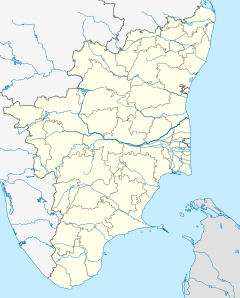
The Vadakkumnathan Temple is an ancient Hindu temple dedicated to Shiva in Thrissur, in the Thrissur district of Kerala, India. The temple is a classical example of the architectural style of Kerala and has one monumental tower on each of the four sides in addition to a koothambalam. Mural paintings depicting various scenes from the Mahabharata can be seen inside the temple. The shrines and the Kuttambalam display vignettes carved in wood. The temple, along with the mural paintings, has been declared as a National Monument by India under the AMASR Act. According to popular local lore, this is the first temple built by Parashurama, the sixth avatar of Vishnu. Thekkinkadu Maidan, encircling the Vadakkumnathan Temple, is the main venue of the renowned Thrissur Pooram festival.

The period of the imperial Cholas in South India was an age of continuous improvement and refinement of Chola art and architecture. They utilised the wealth earned through their extensive conquests in building long-lasting stone temples and exquisite bronze sculptures, in an almost exclusively Hindu cultural setting.

Thillai Nataraja Temple, also referred as the Chidambaram Nataraja Temple, is a Hindu temple dedicated to Nataraja and Govindaraja, the form of Shiva as the lord of dance and Maha Vishnu as the Judge of the dance. This temple is located in Chidambaram, Tamil Nadu, India. The temple is glorified in the Naalayira Divya Prabandham, the early medieval Tamil canon of the Alvar saints from the 6th–9th centuries CE. It is one of the 108 Divya Desam dedicated to Vishnu, who is worshipped as Govindaraja Perumal and his consort Lakshmi as Pundarikavalli Thayar. This temple has ancient roots and a Shiva and Maha Vishnu shrine existed at the site when the town was known as Thillai. Chidambaram, the name of the city literally means "stage of consciousness". The temple architecture symbolizes the connection between the arts and spirituality, creative activity and the divine. The temple wall carvings display all the 108 karanas from the Natya Shastra by Bharata Muni, and these postures form a foundation of Bharatanatyam, an Indian classical dance.
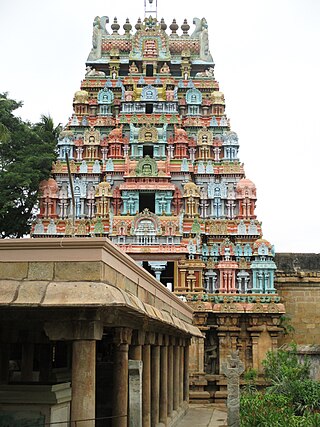
Jambukeswarar Temple, Thiruvanaikaval is a temple of Shiva in Tiruchirapalli (Trichy) district, in the state of Tamil Nadu, India. and one of the five major Shiva Temples of Tamil Nadu representing the Mahābhūta or five elements; this temple represents the element of water, or neer in Tamil. The sanctum of Jambukeswara has an underground stream.
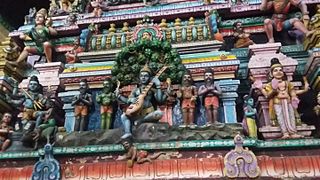
Ravishwarar Temple is a Hindu temple in Chennai, India. Built during the Chola period, the temple is dedicated to Shiva. It is located at Murthy Iyengar Street in the northern neighbourhood of Vyasarpadi.
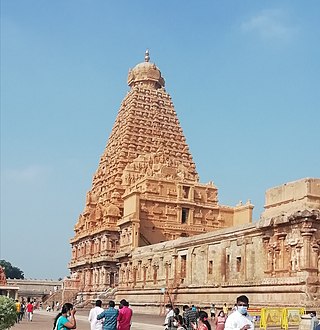
Brihadishvara Temple, called Rajarajesvaram by its builder, and known locally as Thanjai Periya Kovil and Peruvudaiyar Kovil, is a Shaivite Hindu temple built in a Chola architectural style located on the south bank of the Cauvery river in Thanjavur, Tamil Nadu, India. It is one of the largest Hindu temples and an exemplar of Tamil architecture. It is also called Dakshina Meru. Built by Chola emperor Rajaraja I between 1003 and 1010 CE, the temple is a part of the UNESCO World Heritage Site known as the "Great Living Chola Temples", along with the Chola-era Gangaikonda Cholapuram temple and Airavatesvara temple, which are about 70 kilometres (43 mi) and 40 kilometres (25 mi) to its northeast respectively.
Melakasakudy is a revenue village in the Karaikal taluk of Puducherry District. It is situated to the west of Karaikal town.
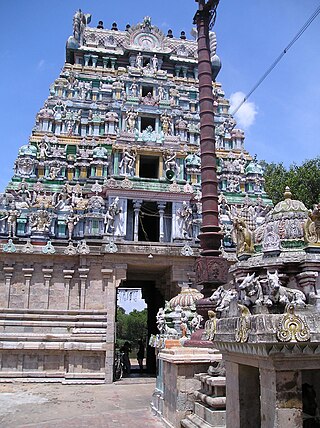
Kalyanasundaresar Temple, Nallur or Thirunallur is a Hindu temple dedicated to the deity Shiva in Nallur, Tamil Nadu, India. It is located 10 km (6.2 mi) away from Kumbakonam, 6 km (3.7 mi) east of Thirukkarugavur, and 30 km (19 mi) south of Thanjavur.

Sivagurunathaswamy templeis a Hindu temple dedicated to Shiva located in the village of Aduthurai, Tamil Nadu, India. Shiva is worshipped as Sivagurunathaswamy, and is represented by the lingam. His consort Parvati is depicted as Prabhavalli. The presiding deity is revered in the 7th century Tamil Saiva canonical work, the Tevaram, written by Tamil saint poets known as the nayanars and classified as Paadal Petra Sthalam.

Vedapuriswarar Temple, Thiruvedhikudi or Vazhaimadunathar Temple is a Hindu temple dedicated to Shiva located in Thiruvedhikudi near Tiruvaiyaru, Tamil Nadu, India. The presiding deity is revered in the 7th century Tamil Saiva canonical work, the Tevaram, written by Tamil poet saints known as the nayanars and classified as Paadal Petra Sthalam. The temple is counted as the earliest of all Chola temples.

Tirunallar Saniswaran Temple or Dharbaranyeswarar Temple is a Hindu temple dedicated to the deity Shiva, located in a village, Thirunallar of karaikal district of Union territory of Puducherry (24 km from Nagapattinam town of Tamil Nadu.
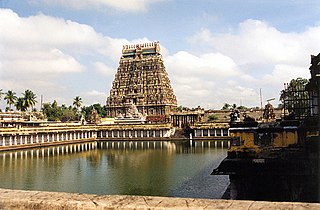
Iconography of Shiva temples in Tamil Nadu is governed by the Shaiva Agamas (IAST:Āgama) that revere the ultimate reality as the Hindu deity, Shiva. Āgama in the Hindu religious context means a traditional doctrine or system which commands faith. Temple worship according to Āgamic rules can be said to have started during the Pallava dynasty in South India, but they were fully under establishment during the Chola dynasty The temples during the Chola period expanded to Sri Lanka and islands in South East Asia. The temple complex was expanding with niches for various deities on the stipulated sides of the sanctum. Lingam was universalised and prakarams (precincts) with subsequent deities came up. The temple parivara expanded considerably during the Chola period. The niches of following Āgamic rules for building Shiva temples in Tamil Nadu, a South Indian state continues even in the modern era. Some of the prime images like that of lingam, Vinayagar and Parvati are present in all the Shiva temples. Almost all the temples follow the same custom during festivals and worship methods with minor exceptions. Most of the Shiva temples in Tamil Nadu and Sri Lanka are built in Dravidian architecture.

Veerasolapuram is an ancient village located near Kallakurichi in Kallakurichi district, Tamil Nadu, India.
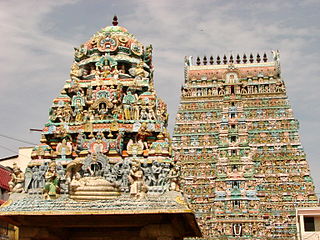
Tamil Nadu is known for its ancient temple architecture. Nearly 33,000 ancient temples, many at least 800 to 2000 years old, are found scattered all over Tamil Nadu. As per Tamil Nadu Hindu Endowments Board, there are 38,615 temples. Most of the largest Hindu Temples reside here. Studded with complex architecture, a variety of sculptures, and rich inscriptions, the temples remain the very essence of the culture and heritage of Tamil land, with historical records dating back to at least 3,000 years.
The Sripuranthan Natarajan Idol, is a 900-year-old statue of Natarajan — the dancing Shiva — that was stolen from the ancient Brihadeeswarar temple of Sripuranthan, smuggled to the United States, and then sold to the National Gallery of Australia, Canberra with a false provenance, for US$5.1 million. The statue was consequently returned by Australia to the Indian government on ethical grounds, once questions were raised on due diligence not being followed during the acquisition.

Avanibhajana Pallaveshwaram temple also called Stambeswarar Temple is a Hindu temple dedicated to Shiva, located in the town of Seeyamangalam, Tiruvannamalai district in Tamil Nadu, India. The temple is constructed in Rock-cut architecture by the Pallava king Mahendravarman I during the 7th century. The cave temple had later additions from the Chola and Vijayanagar Empire.

Kunnandarkoil Cave Temple in Kunnandarkoil, a village in Pudukottai district in the South Indian state of Tamil Nadu, is dedicated to the Hindu god Shiva. Constructed in Rock-cut architecture, the temple is believed to have been built during the 8th century by Muttaraiyar kings, the cardinals of Pallavas, with later expansion from the Vijayanagar Empire. The rock-cut architecture in the temple is a specimen of the late Pallava Art and an early example of Chola Art. The temple has various inscriptions from Cholas, Chalukyas, Pandyas and Vijayanagar Empire. The temple is considered one of the oldest stone temples in South India. The temple is maintained and administered by Department of Archaeological Survey of India as a protected monument.
Karaikal Kailasanathar Temple is a major temple in Karaikal, India. It is located opposite to another notable temple, the Karaikal Ammaiyar Temple. The main deity worshipped at the temple is Lord Kailasanathar.

Veerateeswarar Temple is a Hindu temple located at Korukkai in Mayiladuthurai district of Tamil Nadu, India. The presiding deity is Shiva in the form of Veerateswarar and his consort is known as Gnanambigai. The presiding deity is revered in the 7th century Tamil Saiva canonical work, the Tevaram, written by Tamil saint poets known as the nayanars and classified as Paadal Petra Sthalam, the 276 temples that find mention in it.

The Punnainallur Kailasanathar Temple, is a Hindu temple dedicated to Shiva located at Punnainallur near Thanjavur in the state of Tamil Nadu, India.

